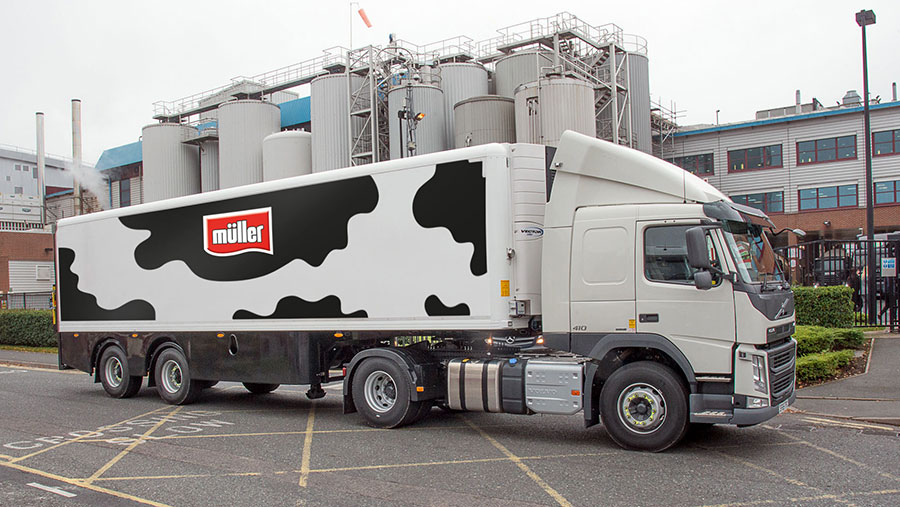Müller to slash Scottish milk production

Fourteen Aberdeenshire dairy farmers face a bleak future after being given a year’s notice that their supply contracts will be terminated as part of Müller Milk & Ingredients’ review of its Scottish operations.
These dairy farmers are located in areas which present heightened or complex logistical transport challenges for Müller, says the company.
“As far as I can see it, their number one option will be to leave dairy,” said farmer supplier and head of the Müller farmer board David Herdman.
See also: Video: 15 key steps to achieve best-practice drying-off protocol
The board was already helping farmers in Lincolnshire, Nottinghamshire and Leicestershire affected by Müller’s structural changes, said Mr Herdman.
It was early days for the Aberdeenshire producers – there were processors who might take their milk, but the transport costs could be very high, he said.
If any of those affected find an alternative buyer in advance of the end of their notice period, the company says it will support an earlier move.
Tiered transport charge
Müller is also hitting its Scottish producers with a tiered transport charge of up to 0.85p on every litre produced, starting in February 2020.
Those who expanded fastest between 2017 and 2019 will shoulder a proportionately higher charge than those who have grown more slowly.
What are the changes?
Muller will be implementing transport charges from February 2020, based on 2019 v 2017 actual 12 months’ production as follows:
- Greater than 15% expansion – 0.85p/litre on all litres produced
- Above 5% to 15% expansion – 0.55p/litre on all litres
- Up to 5% expansion – 0.25p/litre on all litres
The charge will apply across all farms and groups except Aberdeenshire farms who already pay a transport charge.
Charge rates will be reviewed annually with changes in customer demand and farm supply volumes reflected in the review.
The review was launched a month ago following a 25% surge in Scottish milk production in five years to a level which the company says is substantially greater than local demand for fresh milk.
Müller has 230 Scottish dairy farmer suppliers and the rise in production means 6,000 tanker movements travelling a total of 2.5m miles to take the surplus milk south to England for processing.
“This is a decision they (Müller) have made through trying to make efficiencies in their business to counteract losses they’ve made, but it seems a drastic move to hand out notices,” said Mr Herdman.
He added that more notices would have been issued if it were not for the imposition of the transport charge.
‘Extremely unwelcome’
Rob Hutchison, milk supply director for Müller Milk & Ingredients said: “We fully appreciate that these measures will be extremely unwelcome and destabilising for our farmer suppliers, particularly in the north east of Scotland, but the current situation is unviable and we must act.
“We completed the largest single investment in fresh milk processing in Scotland in more than a decade at our dairy in Bellshill last year and we will continue to do what we can to stimulate new demand for fresh milk.
“But with fresh milk already in 96% of the nation’s fridges and overall consumer demand for the product in marginal decline, the reality is that it is extremely unlikely that this sector will soak up the heightened levels of milk production from farms which we have seen.
“Our farm services team will now work closely with affected dairy farmers and we will do everything in our power to help them adjust to the changes which we must now make.”
Devastating news
As well as the Müller Milk Group farmer board, Müller involved the National Farmers Union Scotland and Scottish Government in discussions on the review.
NFU Scotland President Andrew McCornick said: “This is clearly devastating news and the livelihoods and viability of all those Scottish dairy farmers supplying Muller have been undermined by the outcomes of this review.
“For those served notice, Muller are having a face to face meeting with these farmers in Aberdeen next week and NFU Scotland has asked if we can attend to support those farmers affected.
NFU National Dairy Board chairman Michael Oakes said: “This latest announcement from Müller, coming just a fortnight after the collapse of Tomlinson’s Dairies in Wales, will raise even more concerns that the liquid milk market in the UK is broken.
“Tight margins throughout the dairy supply chain have meant many businesses are failing to achieve sustainable returns which is threatening the long-term prosperity of the sector and leaving farmers carrying much of the risk.”
